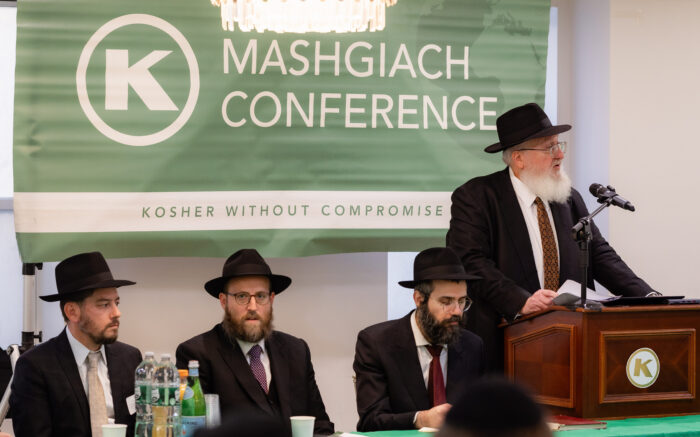For months before Passover, the public is bombarded with ads in all the Jewish publications promising you the “Best Passover Ever” to be enjoyed from the most exotic locales to within commuting distance of your workplace. The patrons avail themselves of these programs for a myriad of reasons, from simply not wishing to undergo the cleaning and cooking that preparing for Passover entails, to their house not being large enough to contain the extended family for the holiday, to wishing to experience an adventure in a posh, upscale hotel.
Program operators must begin planning many months before Passover. Of primary importance is the hotel itself. Equally important is enlisting a renowned caterer or famous chef as much of this holiday revolves around food. The entertainment is also a big concern for a successful program. Finally, choosing the proper kosher certifying agency is essential, as people are particularly scrupulous when dealing with kashrus during Passover.
For the supervising agency, being responsible for the kashrus at a hotel during Passover is quite challenging. The kashrus protocol must be set way in advance in order to adapt strict standards to a program wishing to service customers away from population centers. Therefore, it requires extreme experience with the complete operations of such programs. Once underway, it is almost impossible to improvise.
The program director and the OK schedule a meeting to determine if the program’s needs can be accommodated by the hechsher. To be discussed are kashrus standards, number of mashgichim, and other important details. The kosher certifying agency then has a representative travel to the proposed location to visualize how the program will unfold. He inspects the kitchens, the cooking equipment and utensils to be used, the eating areas, the size of the ballrooms and their proximity to the kitchen, and guest rooms (to determine if there can be a Shabbos elevator which automatically stops on every floor as well as if the room locks are manual, since key cards cannot be used on Shabbos and Yom Tov). Even the restrooms need to be inspected for automatic features. He also meets with the kitchen and management staff to gauge their level of kashrus understanding and experience and to educate them on the requirements of the hechsher. He also walks the perimeter of the grounds to get a mental picture of where the eruv that will encircle the hotel will be placed. An eruv is needed to give the guests the option of carrying items to and from their rooms to the outdoor gardens, pushing baby strollers, etc. as well as to enable the Pesach program to access a stationed refrigerated storage truck if needed, or to set up a buffet outdoors on Shabbos during the program. Interestingly, sometimes, having a location that never hosted a Passover program is helpful as many programs and kosher supervisions operate differently and the past experiences on the part of the hotel staff can create confusion.
A critical element of a successful kosher program is choosing a skilled head mashgiach or Rav HaMachshir. As guests are understandably concerned about the kashrus , this mashgiach acts as a reassurance that the kashrus throughout the program is being monitored to the minute detail. The head mashgiach is a rabbi with great experience in the kashrus field. He must be well versed in the laws of kashrus regarding milk and meat, Passover, and the halachos of Shabbos and Yom Tov. In addition, he must be able to manage personnel, delegate responsibilities, and be a good communicator with the guests, hotel staff and management, and the people running the program. Just as important is selecting a team of qualified mashgichim. These young men must be sincere and responsible. They are carefully screened by the OK for their ability to work together as well as their basic knowledge of the issues that may arise on Pesach. As the mashgichim must function as a finely tuned machine, it is imperative that they all meet ahead of time with the program director and chefs. It is not uncommon to have six, eight or even ten mashgichim working simultaneously throughout different parts of the hotel.
The next step is ordering supplies and provisions for the program. To do this, they must first submit their menus and coordinating ingredient lists to the OK for review and approval. (For example: roasted meats cannot be served for the sedarim, so the kosher certifying agency needs to make sure it is not on the menu.) Once approved, the program director in conjunction with his chef, orders the raw materials needed. As kosher for Passover goods are produced in limited supply, an individual program must often receive items weeks in advance of Passover and store them at the program’s expense (thus adding to the overall cost of the program). Depending on the expected clientele, the program will either proclaim itself non-gebrokts or gebrokts. However, while care can be given that no foods are baked, cooked or prepared with matzah, one who requires that dishes that come into contact with matzah may not be used cannot fully keep this at a hotel, because while the kitchen atmosphere can be controlled, the guests in the dining areas cannot. A solution to this difficulty is to eat only from plastic tableware or to use brand new flatware and dishes each time you are served. In addition, following the custom of not using any utensils that fall to the ground during Passover is almost impossible to observe in a hotel.
As for koshering the hotel for Passover, sometimes a group of mashgichim travel to the hotel for a week during the winter to kosher it, prepare a freezer full of food (sealed under lock and key) and use these provisions during Passover. However, in most instances, the hotel is koshered several days before Passover. Sometimes the hotels have other functions scheduled during that period which provides the kosher agency with an extra challenge. For a kitchen to be koshered, all the surfaces of the tables, ovens, stovetop, refrigerators, freezers, deep fryers, braziers, skillets, sinks, storage areas, pots, pans, and kettles need to be cleaned spotlessly. Many utensils need to be segregated for 24 hours prior to kosherizing. An outside cleaning service is brought in to clean to the mashgiach’s satisfaction. This alone can take several days and can be quite overwhelming, even for experienced mashgichim.
Then the mashgichim trained in the use of blow torches begin to work. All the surfaces of an item require kosherizing and are heated to the correct temperature. Often the local fire department is notified in advance that this activity is taking place and may even be present to deal with the inevitable triggering of fire alarms. The grills and skillets need to be koshered with a glowing layer of hot coals. Glassware must be soaked in water for 24 hours, the water emptied and replaced. This process must be repeated twice more. Wooden surfaces such as butcher blocks must be sanded down. The dishwashers must be stripped down, meticulously cleaned and then the internal thermostat must be overridden (often with the assistance of a technician) so the cycle can be run with boiling water. During the koshering period, the entire mashgiach team generally works around the clock, all while dealing with the provisions that are arriving constantly and ensuring that they meet the OK kashrus standards.
If the hotel has more than one kitchen, one can be kashered first to enable the chef to begin cooking. Of course this ties up one or more of the mashgichim, making them unavailable to kosher the rest of the facility. Sometime during the end of the kashering period begins the vegetable checking. As Passover requires several unique produce involving some that are prone to insect infestation, (such as Romaine lettuce) a large part of a mashgiach’s duties involve washing and checking these vegetables and herbs. Large sinks and a well-illuminated area are essential for proper insect inspection.
Once Pesach begins, the mashgichim are faced with a new set of challenges. Sometimes guests will try to bring their own wine or matzah to the seder meals. While hotel programs frown upon this practice (indeed many make quite a profit supplying customers with wines priced above the basic package) the mashgichim must circulate among the guests and respectfully persuade them that these items are not allowed in the eating areas.
While, ideally, arranging the mashgichim into shifts is preferable, this does not occur until after the first two days of Yom Tov as the kitchens literally operate around the clock. Only once Chol HaMoed begins, can this shift formation take place. The mashgichim work in shifts of 8-10 hours while the head mashgiach is constantly on call.
This year provides an additional challenge as Passover ends on a Thursday night. Many programs are offering the option of extending your stay through Shabbos. While challah will be served at the Shabbos meals, it will be bread that was purchased before Passover, frozen and sold, in order to be available for Shabbos. The switchover will require the mashgichim to work from the moment Passover ends to supervise the Shabbos preparations.
This year the OK is supervising several Passover programs staffed by top-notch mashgichim. You can be assured that while you are enjoying Passover at one of these programs, the OK is looking out for your kashrus needs. As far as the mashgichim are concerned, it is only after Passover that they are able to feel the freedom of Zman Cheiruseinu.


 EN
EN  ZH
ZH  KR
KR  BR
BR  ES
ES  IN
IN  IL
IL 




